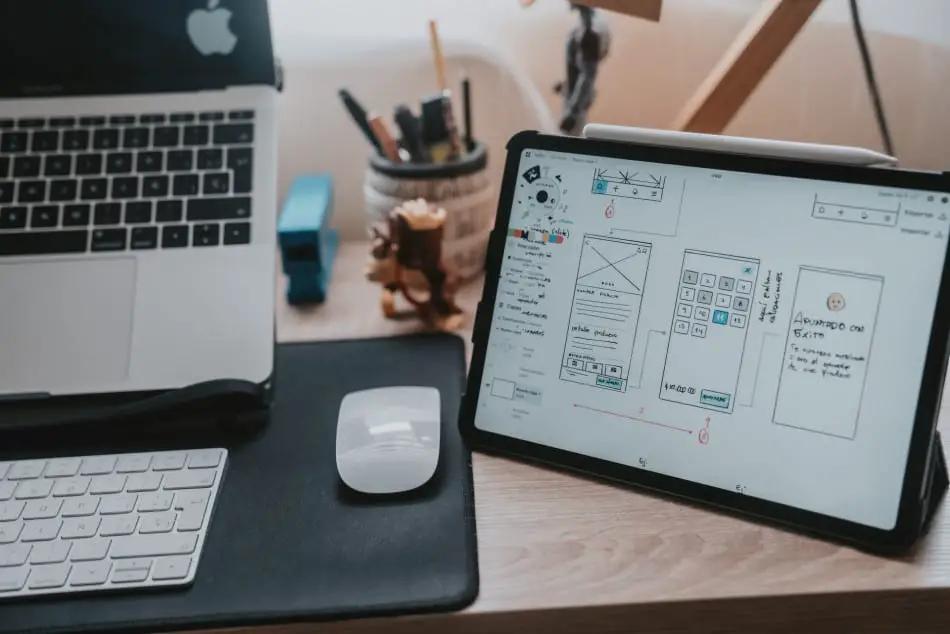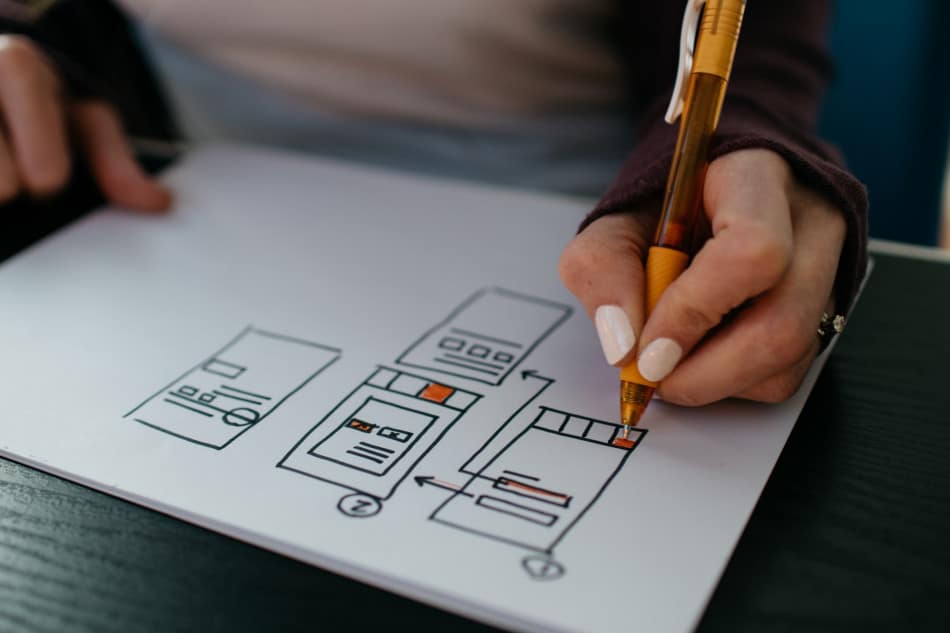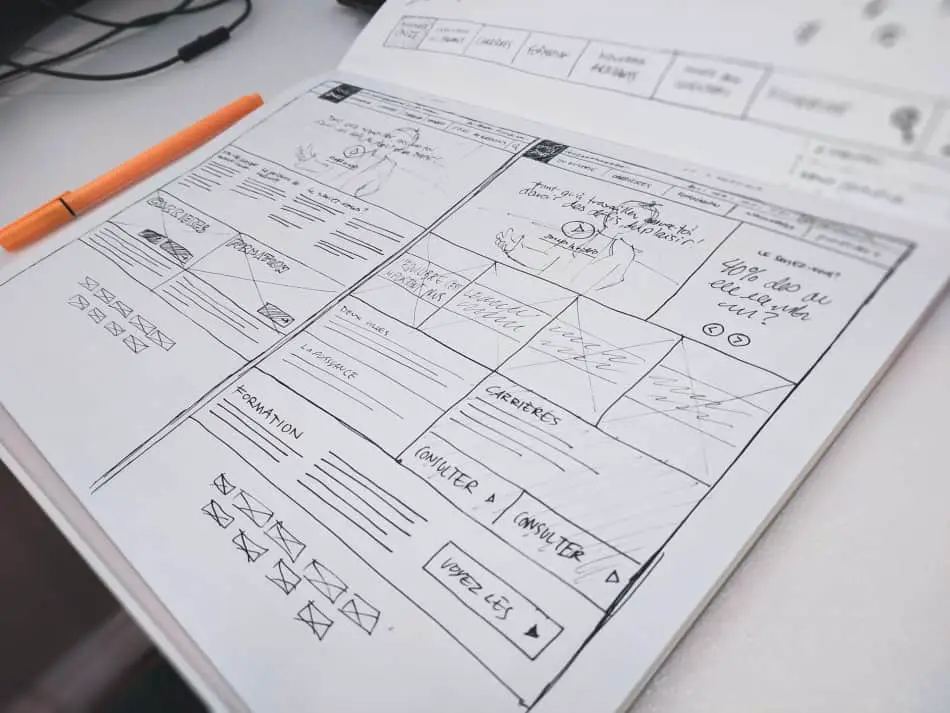UX design has, in recent years, become a hot career to follow for various reasons.
An increased emphasis on user experience in technology has driven an ever-increasing demand for skilled UX designers who can vastly improve the user experience of anybody who uses an app or website.
To learn UX design on your own is absolutely possible. Becoming a fully-fledged UX designer will require a significant amount of research, discipline, and skills development. However, you are not required to have a degree in UX design to have a successful career in this field.
Learning UX design on your own can be challenging, but the challenge will prove worthwhile. Countless online resources will guide you on your path.
The amount of available information can quickly become overwhelming, so it’s important to develop a clear structure to allow you to progress effectively within your UX education.
Can You Learn UX Design On Your Own?
UX design is a relatively new career developed recently due to increased demand for improved user experiences.
Because it has developed as a combination of other vocations, UX design encompasses various aspects of different jobs.
As a result, UX design is a career that many different types of people can go into. Provided they have the correct set of basic skills, people from various fields are well-suited to UX design.
The main requirements are a good understanding of people, an eye for general design principles, and a basic understanding of technology.

Many skills required for UX design can be developed while on the job, provided you have a basic understanding of all key concepts beforehand.
The field of UX design is vast and incorporates various skills and principles. As a result of this information overload about UX design, it can be easy for you to become overwhelmed by the vast array of information available regarding this vocation.
UX design draws on a wide range of skill sets, so anybody following this career path must be highly adept at various skills.
Thankfully, these skills can be honed independently and in your own time.
It can be quite easy to go down a rabbit hole with all the various components that make up the development of your UX design skill set, so it is extremely important to structure your self-education to ensure you remain on track at all times.
The key consideration for acquiring the necessary expertise to become a UX designer is to absorb as much relevant information as possible.
The key word here is “relevant” – because there is such a vast amount of information available about this field, it’s imperative to filter through what is relevant to you and your career advancement.
Because there are so many varying opinions within UX design, it’s important to form your own educated opinion.
By focusing on the core concepts of UX design and its basic skills, you can form your own opinions and filter out unnecessary information.
Beginning a career in UX design is far easier if you are familiar with the technologies and methodologies involved in UX design.
If you are making a career transition, this will be easier if you understand humans and their behavior well.
It’s also important to have good facilitation skills and a good understanding of technology and information architecture.
It’s important to read a lot about UX design, sociology, psychology, and design, to allow you to develop a deeper understanding of what goes into user experience design.
Finding a skilled mentor is another essential component of learning UX design. They will help ensure you remain on the best possible path for your UX education.
A mentor will also give you feedback on your progress as a UX designer and help steer you along to ensure you remain on track.
-> Read Also What Is An Autodidact?
UX Designers, Explained

UX designers have, in recent years, become high-demand individuals in many companies across the globe.
These highly-skilled individuals are apt to build solutions to problems and analyze them to make the lives of other people easier and more enjoyable.
People with a good understanding of human behavior tend to thrive in the field of UX design, as they will be able to put themselves in the shoes of the person using the application, product, or website to develop the best possible solution.
The fundamental role of any UX designer is to ensure that the users of an application, product, or website will have a good experience throughout the time they interact with the brand, application, or website.
Skills Needed For UX Design
There are various skills required to be a successful UX designer. Most of these skills can and will be developed as you progress in your career.
Still, it’s important to know whether you intrinsically possess these skills or not.
Firstly, it’s important to be able to shift between the left side and the right side of your brain. A career in UX design requires you to be able to think analytically while simultaneously solving problems creatively.
You will need to be able to come up with ideas constantly while being able to solve problems effectively.
To create an effective digital product that meets users’ needs while meeting the business’s goals, UX designers must understand why users perform specific actions.
It’s also important to understand why these app/site users either continue to use a specific site or abandon using it altogether.

In addition, a UX designer must possess significant knowledge of design principles and best practices, the psychology of app users, the interaction between humans and computers, general usability, interactive patterns, and the underlying technology behind any app, product, brand, or website.
Another highly valuable character trait for any UX designer is empathy. UX designers must possess empathy to be able to “put themselves in the shoes” of the product user.
A UX designer must bring themselves into the user’s psyche at every project step to ensure ultimate usability.
UX designers must have a thirst for knowledge and an inherent desire to never stop learning. Eclecticism is also highly prized, as is a generally curious approach to the world.
UX designers must be able to convey their ideas clearly and in an easily digestible manner. UX designers must also be open to challenges and see challenges as opportunities to further develop their skills.
As a UX designer, you will have greater success if you have skills in development, visual design, marketing, research, and analysis.
A UX designer must be able to question every decision they make at any time. Asking “what, why, and how” questions are important for every decision.
It’s important to be able to ask these questions, as the solutions you come up with throughout your career need to fulfill users’ needs while simultaneously living up to the requirements of the business.
At the end of the day, it is also extremely important that you can switch off your user experience problem-solving skills at the end of the day.
-> Read Also How Long Does It Take To Learn HTML By Yourself?
Understanding People In UX Design
Understanding people is a fundamental skill and character trait required in UX design.
As digital production expands and businesses focus more on their users, UX designers are brought in to optimize the users’ experience of any product, application, or service.
UX design is intended to create a delightful user experience while ensuring the needs and wants of users are fully met.
This is achieved through a combination of sociology, psychology, and technology.

It’s essential for a UX designer to fully understand what motivates people and what scares them. It’s also essential to understand their key personality drivers while repeatedly asking “why?”.
UX designers need to develop an understanding of what is being communicated by the users during the research component of their work.
The UX designer must then remember this communication correctly while incorporating the user feedback as input into their work.
It’s important to use this as a guide. In the field of UX design, your product users are your guides who assist you in developing the optimal product, service, or application that serves their needs.
Becoming A UX Designer
There are various ways for you to become a UX designer on your own. Whichever way you approach your UX education, you must follow a strict process to manage your time effectively and avoid getting distracted during this period of self-study.
You must start small with UX design. Begin by drawing on your past experiences and various skill sets. This will allow you to discover your strongest talents and establish which skills you need to have to progress further.
This is an important step in your UX education that will help you prioritize where to focus your time and establish precisely how you will need to develop certain aspects of certain skills to allow you to make continued progress.
Once you have established which skills you need to acquire, work methodically at acquiring the necessary skills to remain on track with your career development.
Sift through the available resources and educate yourself on all the basics of user experience design to ensure a fair understanding of all the processes involved in the field.
A basic understanding of web and user interface design will greatly benefit your UX education.
Reading and researching in UX are a fundamental part of your UX design education. No matter how long you have worked within the UX field, reading and researching is an aspect of your UX design education that will never end.
It’s essential for UX designers to stay on top of current trends and research to ensure their work remains relevant.
Understanding what UX designers do is another important aspect of starting a new career in UX design.
UX design is a broad field, and you will benefit from understanding certain subsections of this field of work.

By understanding all the roles a UX designer must take on across various disciplines, you will better understand where your particular interest will lie within that field.
Having various design tools and resources at your disposal throughout your UX education is important. This will allow you to practice new skills as you learn them.
This will also allow generally allow you to familiarize yourself with UX essential tools used in the industry and develop your ability to use them.
Sketch is a basic UX design tool that is great for UX beginners. This will allow UX designers to draw up their drafts with a set of highly expressive drawing tools.
Photoshop is another design tool that is extremely useful for UX designers to master.
This software may make it easier for UX designers to create their design drafts and create multiple iterations.
Illustrator, another offering by adobe, is a vector program that will allow any beginner in UX design to create their own logos, icons, illustrations, and typography.
Mockplus is a prototyping tool for apps and websites. It will allow designers to turn their design ideas into functional prototypes where they can begin testing, demonstrating, sharing, and iterating.
You may opt to enroll in a UX design course or Bootcamp to gain a structured understanding of the field to allow you to further develop your skill set.
Once you have developed a certain skill set and feel somewhat ready to tackle your first UX assignment, self-assign a project with reasonable deadlines to ensure that you teach yourself to work under a certain amount of pressure.
By completing projects, you will start to build your portfolio.
Building a portfolio of work is essential to your UX education, as it will give prospective employers a tangible indication of your skills.
This will show your abilities, talents, and the skills you have acquired that are particularly relevant to the UX design field, such as developing wireframes and user flows.
It’s important to view successful UX design projects that inspire you. This will help you better understand how good projects are completed and what can be achieved in the field.
It will also help you establish your own expression within the discipline and develop your identity.
Networking is essential to developing your UX design skill set, just as it is with any other career type.
Surround yourself and connect with like-minded people in the UX and UI space who will inspire you and help you develop and advance in your career.
-> Learn More about Self-Learning vs. Classroom Learning: Which Is Better?
Developing An Eye For UX Design
The most fundamental step in enjoying success in UX design is understanding basic design principles. However, this will only lead you to a certain level.
To ensure that you can take your skills to another level, you will need to engage with existing apps and websites critically.
Begin developing your UX eye by taking a good look at a particular website or application that you enjoy using.
Try to analyze the website with a critical eye and understand what it is about the website you enjoy so much.
Note the use of color, the interaction design, and the typography.
Do your best to understand the design in all its aspects to ensure that you are fully aware of what works and doesn’t.
Analyze every aspect of the design before you, and establish what is working and isn’t.
Notice the spacing, the visual hierarchy, the grid according to which the site is designed, and the images or icons used on the page.
By analyzing the site this way, you will be able to develop your visual eye for design as well as possible. If you don’t enjoy certain aspects of the site, try to understand why exactly you don’t enjoy these things.
This will help you know what you do or don’t like, and what does or doesn’t work when working on your projects.
UX Design Bootcamps
UX design boot camps can be particularly helpful in guiding you towards a career in UX design. These structured courses will teach you the skills you need to become a UX designer.
At the same time, UX design boot camps will present the necessary information to you in a concise and orderly manner.
This approach can be particularly helpful for those who do not have the time to independently explore the world of UX design.
There is a fundamental difference between a UX boot camp and an online course featuring instructors. When looking at these two options, you should determine your end goal.
You will need to establish whether the boot camp you are considering will serve as a stepping stone towards another, more comprehensive course.
You must determine if the boot camp in question will play a fundamental role in helping you to change your career path.
Will the UX boot camp you are considering help you land the dream UX job you hope for? It’s important to ask these questions to assist you in choosing the best course for your particular circumstances.
Suppose your goal is to find a job straight after completing the course. In that case, you should opt for a design boot camp that offers proper career guidance while helping you develop your portfolio.
If you aim to become a UX consultant with a broader scope of work, opt for a course that will teach about UX design and UX research.
-> Learn more about the 7 best websites for self-learning
Conclusion
To learn UX design and ultimately land a job as a UX designer, you do not necessarily need to attend a university or college.
A career in UX design will require various skills across various skill sets.
Thankfully, these skills can all be developed independently, provided you are fully committed to the research process.
Sources
- https://www.bigmarker.com/careerfoundry/Become-a-UX-UI-Designer-With-CareerFoundry-f3bb7de9d63eb2f5517aa778-68cb99cf44092e1db1234f49?bmid=6752554a55f
- https://www.springboard.com/blog/design/can-you-self-learn/
- https://www.mockplus.com/blog/post/how-to-become-a-ux-designer
- https://dribbble.com/resources/how-to-become-ui-ux-designer
- https://careerfoundry.com/en/courses/become-a-ux-designer/?popup-tracking=WYSDN-program-UXD
- https://careerfoundry.com/en/short-courses/become-a-ux-designer/
- https://careerfoundry.com/en/blog/ux-design/how-to-learn-to-be-a-ux-designer/
- https://www.quora.com/Can-you-learn-UX-design-on-your-own
- https://www.startupinstitute.com/blog/2016-11-17-teach-yourself-ux-design






